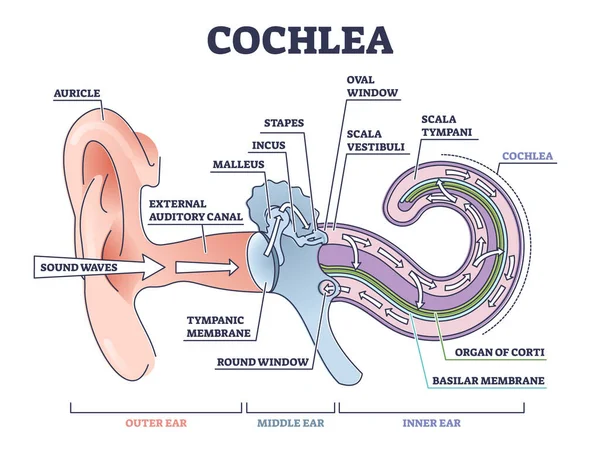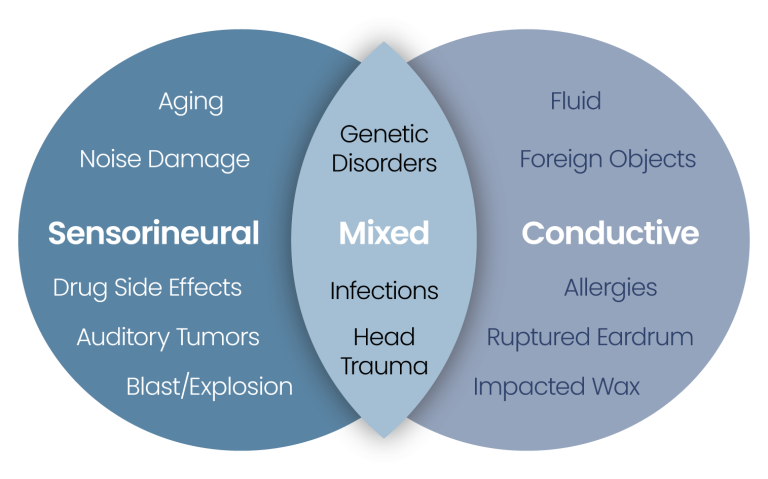Hearing Loss
What Causes Hearing Loss
- Have you ever overslept because you can’t hear your alarm clock?
- Do you find yourself tuning out the conversation over lunch because you can’t hear everything?
- Are you avoiding the theater because you can’t make out the dialogue?
Hearing loss often means feeling left out. Left out of the conversation and out of some of your favorite activities. But it doesn’t have to be that way. You can re-engage with the things you love. The first step in recovering your hearing is to uncover what’s causing it.
48
million
Americans of all ages experience hearing loss, including one in six baby boomers
How Hearing Works
Many individuals often ask the question “What is hearing loss and how does it really affect me?” A person with hearing loss generally is able to hear some sounds very well while others seem muted, faint or not at all. 4 out of every 1,000 babies are born with hearing loss, making it one of the most common birth defects in the United States.
Many individuals often ask the question “What is hearing loss and how does it really affect me?” A person with hearing loss generally is able to hear some sounds very well while others seem muted, faint or not at all. 4 out of every 1,000 babies are born with hearing loss, making it one of the most common birth defects in the United States.
To further understand what hearing loss is, it helps to understand how we hear. Sound waves entering the ear canal are directed to the eardrum, which conducts vibrations through the small bones of the middle ear to the cochlea. The cochlea is a snail shaped organ, known as the organ of hearing, and is lined with thousands of tiny little hair cells. Each hair cell or nerve ending responds to certain sound frequencies that send nerve impulses to the brain which are interpreted as sounds.
So your brain actually does the hearing, the ears are simply the mechanism to convert sound energy outside your head to nerve impulses your brain translates into sounds. Any sound impulse in your right ear is sent to the left side of your brain and any sound impulse in your left ear is sent to the right side of your brain.

Types of Hearing Loss

Age, noise exposure, disease, medication, trauma, and heredity or all common causes of hearing loss. Your hearing is a very complex sense and actually, the most important one that you have. Most people would suggest their eyes to be the most critical sense. But when you think about it, your eyes keep you in touch with objects or things. Your ears keep you in touch with people.
A free diagnostic hearing examination from Wisconsin Hearing Aid Centers can determine what type of hearing loss you have and what steps are necessary to correct the problem. Please contact a location nearest you to learn more hearing loss and improving your hearing.
Sensorineural
Mixed
Conductive
The most common type, it occurs when nerves in the cochlea are damaged and do not properly transmit auditory signals to the brain. This type is typically caused because of age or noise exposure and is very correctable with hearing instruments.
A combination of Sensorineural and Conductive
Effects of Untreated Hearing Loss
If you or a loved one is suffering from untreated hearing loss there are some important facts you should know. Not being able to hear can have long term health consequences aside from creating the obvious communication problems. A number of studies have shown that not being able to hear is linked to brain atrophy in older adults which directly increases your risk of conditions like Alzheimer’s or Dementia. If you or someone you care about is suffering please take action today. The cannot afford to continue putting hearing loss on the back burner of your health care needs.

Untreated Hearing Loss Can Affect the Following:
- Intimacy and warmth in family relationships
- General communication
- Sense of control over your life
- Social participation
- Perception of mental functioning
- Emotional stability
- Communication in relationships
- Untreated hearing loss may increase your risk of Alzheimer’s. (Archives of Neurology Feb. 2012)
- Mild hearing loss linked to brain atrophy in older adults (Perelman School of Medicine at the
- University of Pennsylvania Aug. 2011)
- Hearing Loss is twice as common in adults with diabetes (Annals of Internal Medicine July 2008)
One in three people over the age of 60 have hearing loss, making it one of the most common conditions affecting older adults.
Although most adults wait an average of 5-15 years before seeking help for their hearing loss, there are compelling reasons you shouldn’t. The sooner you get help for your hearing impairment, the easier it will be for your brain to use the auditory pathways it’s developed for processing sound. The same is true for children with untreated hearing loss. Research tell us that babies whose hearing impairment is detected and treated by the time they are six months old are more likely to learn essential speech and language skills than children whose hearing impairment goes undetected. Socially, children and adults with untreated hearing loss are at risk for developing challenges listed below.
The psychological effects of untreated hearing loss for both children and adults can include increased outbursts of anger, low self-confidence, frustration, embarrassment and depression. Adults may experience periods of sadness and grieving as their ability to hear diminishes. They also may feel more fatigued, as the struggle to hear and understand can be physically exhausting.
Fortunately, most of these issues are resolved once the hearing impairment is treated effectively. Hearing health professionals say that children whose hearing impairment is detected and treated early can develop speech and language skills at the same level as their normal hearing peers, which positively affects self-esteem, social interaction with peers and academic success.
Adults have similar success. A recent study found that 73 percent of individuals with hearing loss, and 41 percent of their relatives, believed their family relationships improved once they started wearing hearing aids.
Will My Hearing Come Back?
Sudden hearing loss is often a side effect of living life full throttle. Attending loud concerts, nail-biting football games, or simply pumping it up at spin class can cause hearing loss if the noise gets above 85 decibels. To put that into perspective, driving 50 MPH with your windows down yields an average of 89 decibels, so it doesn’t take much to endanger your hearing.
Research shows that getting treatment immediately after being exposed to a loud noise can dramatically improve the odds of preventing permanent damage. This is because your ears respond to loud noises by sending more white blood cells to your ears. Inflammation, over time, will damage the tiny hairs that detect sound. Seeing an audiologist immediately after being exposed to loud noises is crucial.
Unfortunately, the average person waits 7 years to investigate their hearing loss. Whether they’re in denial or just don’t want to deal with it, waiting to address hearing loss can be devastating.


